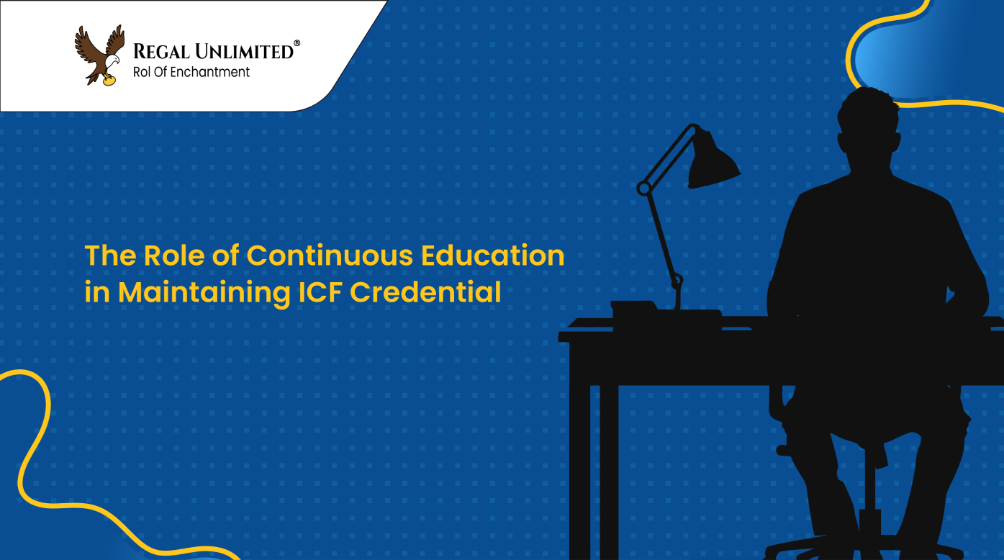Introduction
Obtaining an International Coach Federation (ICF) credential indicates a commitment to learning and excellence. The coaching field is dynamic, continually evolving with new insights, methodologies, and best practices. The ICF recognizes this ever-changing landscape and mandates Continuous Coach Education (CCE) as a cornerstone for credential renewal. The commitment to continuous education ensures that coaches remain at the forefront of the profession, providing the highest quality of service to their clients.
Let’s explore the role of continuous education in maintaining ICF credentials and its profound impact on the coaching practice.
Increasing ICF Credentials Through Continuous Education
1. Ensuring Adherence to Evolving Standards
The ICF sets rigorous standards for coaching competency and ethical practice. Continuous education helps certified coaches stay aligned with evolving standards, upholding the excellence and integrity associated with the ICF credential. Engaging in CCE allows coaches to revisit and deepen their understanding of the ICF Core Competencies regularly, reinforcing their commitment to ethical coaching practices.
2. Keeping up-to-date with Industry Innovations
Coaching is a discipline characterized by continuous innovation and theoretical development. CCE is a gateway for coaches to explore and integrate these advancements into their practice. From emerging techniques to the latest research, continuous education ensures coaches can effectively apply advanced practices that benefit clients.
3. Deepening Coaching Expertise
Beyond familiar coaching principles, CCE offers opportunities for coaches to specialize their expertise in niche areas such as executive coaching, wellness coaching, or life transition coaching. Specialization improves a coach’s skill set and broadens their marketability and range of clients they can serve.
4. Promoting Professional Growth and Development
Continuous education is a path to personal and professional growth. It challenges coaches to reflect on practice, identify areas for improvement, and pursue learning opportunities that support development goals. The process of self-reflection and ongoing learning enriches the coach’s professional journey and elevates the quality of coaching they provide.
5. Cultivating a Global Perspective
Participation in CCE often exposes coaches to global coaching practices and perspectives, fostering a more inclusive and diverse coaching approach. The global perspective is invaluable today, where coaches increasingly work with clients from various cultural backgrounds and across international borders.
6. Developing Self-Awareness and Emotional Intelligence
Continuous education emphasizes coaching emotional intelligence and self-awareness. These skills are essential for coaching, client understanding, and real change. Coaches negotiate their clients’ emotional intelligence through CCE programs in these areas for significant results.
7. Creating a Supportive coaching community
Continuous education brings a community of like-minded professionals dedicated to growth and excellence. The community provides a supportive network for sharing experiences, challenges, and successes. Engaging with the community can lead to meaningful collaborations, opportunities, and a sense of belonging in the professional coaching world.
8. Encouraging Adaptability and Agility
Adapting to change and navigating uncertainty is crucial in today’s fast-paced world. Continuous education equips coaches with the skills to remain agile and responsive to client’s requirements and shifts within the coaching industry. Adaptability is essential for sustaining a thriving coaching practice over time.
9. Meeting ICF Credential Requirements
To renew the ICF credential, coaches complete a specified number of CCE units in a three-year cycle. The requirement highlights the importance of continuous education in credentialing and serves as a structured pathway for coaches to engage in lifelong learning and professional development.
10. Improving Client Satisfaction and Results
Ultimately, continuous education aims to enhance the effectiveness of coaching interventions, leading to greater client satisfaction and more profound coaching outcomes. By keeping informed about the advanced coaching strategies and tools, coaches can tailor their approaches to meet each client’s unique needs, facilitating deeper insights and more significant transformations.
Learn how to enrich your coaching competence here: https://www.regalunlimited.com/icf-certified-coaches-community-enrich-your-coaching-competence/
Conclusion
Continuous education goes beyond meeting requirements for ICF credential maintenance. It represents a coach’s commitment to quality, ethics, and lifelong learning. Continuous Coach Education keeps ICF-certified coaches current and advances the coaching profession. Adopting ongoing education may positively impact their clients and the coaching community. Continuous education unlocks your coaching potential in this ever-changing sector.
Write to us at info@regalunlimited.com for more details on our programme.







